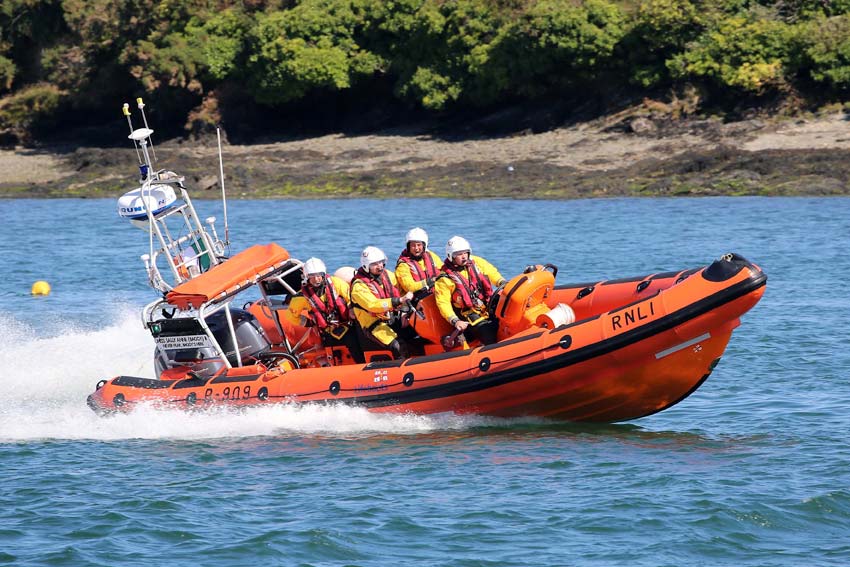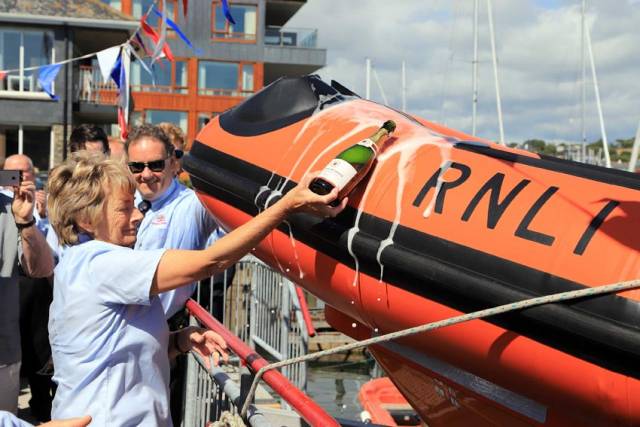#RNLI - With the sun shining down on the assembled crowd, the new Atlantic 85 B class lifeboat for Kinsale RNLI was officially named ‘Miss Sally Anne Baggy II - Never Fear, Baggy’s Here’ during a ceremony at the Kinsale lifeboat station on Saturday (25 August).
The lifeboat, which only went on service last month, was funded by Miss Sally Anne Odell, who has been a close friend of the station and a generous benefactor until her death last year.
The full name of the new lifeboat was the choice of the donor and reflects her sense of humour. It is to be a reminder to the lifeboat crew that their ‘godmother’ is always with them.
As previously reported on Afloat.ie, the Atlantic 85 class lifeboat replaces the Miss Sally Anne Baggy, which has been retired after 15 years of dedicated service that have seen her involved in countless high-profile incidents including the rescue of 30 young people from the training ship Astrid in 2013, and rescuing three fishermen from treacherous seas as their trawler Sean Anthony sank in 2016.
Opening the ceremony, Kinsale RNLI lifeboat operations manager Kevin Gould said: “This is a very special occasion for our lifeboat station and although it is tinged with sadness as Sally Anne is no longer with us, we want to give her lifeboat the naming ceremony befitting its status.
 Sally Anne Baggy II - Never Fear, Baggy’s Here on the water off Kinsale | Photo: RNLI/Nicholas Leach
Sally Anne Baggy II - Never Fear, Baggy’s Here on the water off Kinsale | Photo: RNLI/Nicholas Leach
“Sally Anne was a lifelong supporter of the RNLI and was affectionately known to the crew as ‘The Godmother’. She will always be remembered by our community and we will forever be grateful for her care and affection. She funded the original Kinsale lifeboat and part of the station, and kept in close contact with the crew throughout the years.”
Robert Acton took the part of Miss Odell and gifted the lifeboat into the care of the RNLI. Accepting the lifeboat on behalf of theiInstitution, RNLI area lifesaving manager Brian O’Driscoll — who is a former lifeboat station coxswain with Castletownbere RNLI — spoke of how inshore lifeboats have been keeping people safe in this part of the world since 2003.
He praised the volunteers with Kinsale RNLI who, he said, “give up their time and are the embodiment of willingness and selflessness in helping others in need.”
Kinsale RNLI helm James Grennan was chosen to accept the lifeboat on behalf of the station and the vessel was named by Valerie Good, chair of the fundraising team who poured champagne over the bow of the lifeboat, a tradition that has been undertaken at every naming ceremony for many years.
The vote of thanks was given by Tricia Tyson, volunteer lifeboat press officer for the station, and the music was provided by a choir representing all Kinsale churches. Rev Peter Rutherford and Fr Peter Keogh delivered the service of dedication.
Many RNLI lifeboat stations were in attendance, including fellow Cork crews from Courtmacsherry, Crosshaven, Union Hall and Youghal, as well as Dunmore East in Waterford.































































